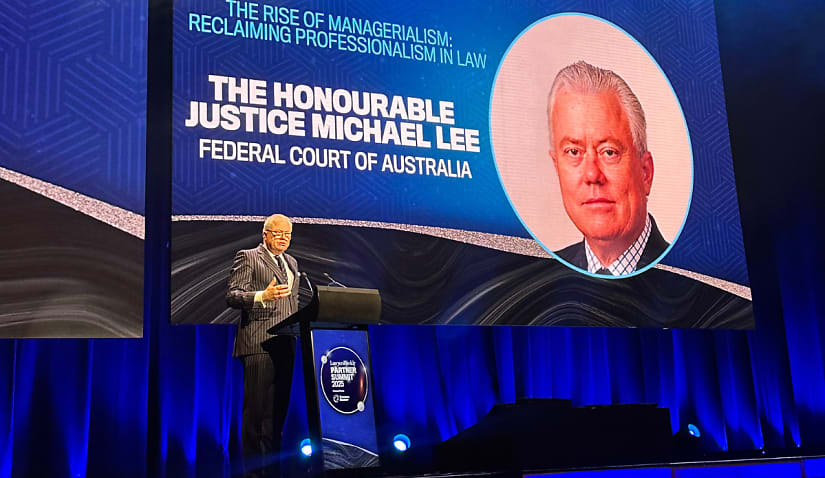Managerialism may have created the appearance of sleek, optimised law firms, but Justice Michael Lee said the ideology is “theatre” that has eroded professionalism and blinded once-ambitious and independent lawyers with billing targets and efficiency goals.

Speaking at the 2025 Lawyers Weekly Partner Summit, Justice Michael Lee of the Federal Court of Australia said the emergence of managerialism in law firms has resulted in lawyers being judged on their ability to meet business benchmarks rather than their legal skills.
Referring to the research of Dr Ronald Purser, Justice Lee said managerialism assumes organisations need oversight to succeed and problems are best solved not by those who are experts in their fields, but by people whose expertise lies in managing others.
“Managerialism, of course, promises order, efficiency and growth, but what we must guard against is creating an environment where we are left with a hollowed-out version of professionalism – one where law is reduced to metrics, where meetings replace mentoring, and where critical decision making, particularly as it relates to ethical judgements, is outsourced to people who don’t practice law and never have,” Justice Lee told the audience of partners and leaders.
For law firms, managerialism can often take the form of “so-called strategy sessions” where people repeat the same jargon and identify the same problems but produce no meaningful change. Justice Lee said what they have done is created the “appearance of motion”.
“Purser would suggest that many of these meetings were rarely about solving problems; they were about managing perceptions, ensuring the right language was used, and the right visuals are shown. This is not law, it’s theatre, and it’s wasted,” Justice Lee said.
While there is some value in a more streamlined approach, particularly for law firms that are also big businesses, Justice Lee questioned whether the extent of change was truly necessary.
With the endless strategy meetings and commitments to meeting billing targets at the forefront, senior lawyers who once strived to hand the “busy work” of their youth to the next generation have instead found themselves under constant pressure to succeed.
Seeing the extent of this workload, Justice Lee warned it could deter junior lawyers from wanting to climb the ranks of seniority. Further, the judge speculated whether the commitment to strategy meetings meant there was less time to mentor these new lawyers.
To overcome managerialism and return to a profession that values autonomy and decision making, Justice Lee said to “fight back”.
This starts by rebuilding a professional culture where law is not a product, clients are not units of business, and legal work “is a vocation rooted in ethics, justice and trust”. Young lawyers must also be taught to resist the shift back towards managerial thinking.
Ultimately, lawyers must reflect on whether sufficient emphasis has been given to the importance of their professional ethics.
“I do not think for a moment we’ve lost that sense entirely, but I’m not as sure it is as strong as it once was. I trust somewhere in the spreadsheets and performance reviews was what brought most of us to the law in the first place and believe that words matter, that truth matters, and that honour is central to our profession,” Justice Lee said.
